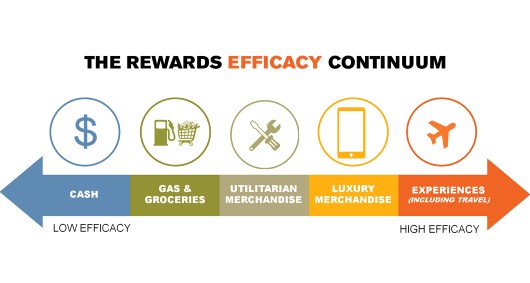Competitiveness is hard-wired in most salespeople. If you’re able to add a compelling sales incentive structure that ties in relevant rewards, you’ll see that excitement grow exponentially.
The challenge with sales motivation isn’t as simple as choosing a desired outcome (like increased calls or higher conversion percentages) and promising an award to the winner. To effectively motivate reps, there are some simple rules to follow that can help increase the impact of your sales incentives.
1. Offer choice.
Motivation can be very specific to an individual. Understanding your team members and using that knowledge to build options for them to choose from is an important foundational aspect to any sales incentive program.
Find out what motivates your reps, then ask them what’s needed to achieve those items.
Sometimes the rep will name a goal, and many times this goal will be equally or more ambitious than the one that would have been given to them. Most salespeople are honoured by the responsibility to choose their own objective and reward so they don’t want to let you down by picking an easy goal versus something that will be more of a challenge to reach. Make sure you include a deadline to achieve these goals and establish key progress touchpoints to ensure success.
Once you have the chosen sales goals, progress checkpoints, deadlines, and awards, you’re ready to announce the sales incentive to your team.
2. Inspire with non-monetary rewards.
An overwhelming number of behavioural economic studies have shown that giving cash-based awards is one of the least motivational ways to drive sales engagement and results. For example, if you give the winner of a sales contest a $500 cheque, they may use it for practical things like buying groceries or paying their monthly utilities. The problem is the glow of winning fades relatively quickly when it’s put towards something that’s a part of everyday living. In behavioural economics, the cash award would be labelled as having low efficacy.

On the other side of the rewards efficacy model, developed by Dr. Ran Kivetz, Columbia Graduate School of Business, are merchandise and experiences. If you award the winners of your sales incentives with these items, you’ll guarantee they will tell the story of their award to others, and when they do, there will be a positive link back to the behaviour that earned them that award in the first place.
As long as the reward is personal and memorable, it will be motivating.
3. Give everyone a chance.
Announcing a new sales incentive is exciting. Hearing about a new incentive and knowing you’re out of the running the first day is frustrating and incredibly demotivating. To avoid this, make sure there is equal opportunity for everyone to achieve the goals they’re working towards.
Segmenting your audience is one way to create fair opportunities for improvement and achievement. Grouping your sales team in like achievement groups so they can compete against like peers (as opposed to everyone on their team or repeat top performers) will help overall engagement and buy-in to the program.
Head-to-head match-ups are another way to even the playing field and motivate. Pitting your 1 and 2 against each other, and your 3 and 4 against each other (and so on) levels the playing field.
Switching up the rules of your incentive so you’re not rewarding the same skills or behaviours every time is also important. If you awarded total sales one month, award close rate the next. This will allow you to engage different behaviours that are key to driving your business while keeping everyone’s skills sharp.
4. Know HOW to deliver recognition.
Like motivation, recognition is a very personal and unique thing. Some salespeople are turned off by public recognition. Standing up in front of their peers to receive an award embarrasses them as opposed to making them proud. Others crave the spotlight and want to see their name at the top of the leaderboard.
Knowing how to best recognize a rep for a job well done is just as important as the award they are earning to ensure the behaviour is repeated. Surveying your reps can help for designing future incentives:
- “Would you rather get praise or acknowledgment in front of the team or in private?”
- “If you win a contest, what’s the best way to announce that?” (Email, at a team meeting, at a private check-in like this one, etc.)
- “Are you motivated by stack rankings or leaderboards?”
There is no one exact way to motivate. It can be equal part art and science. These strategies have been proven to be successful, but it’s worth experimenting to find the optimal sales incentives program for your team, objectives, and culture.
